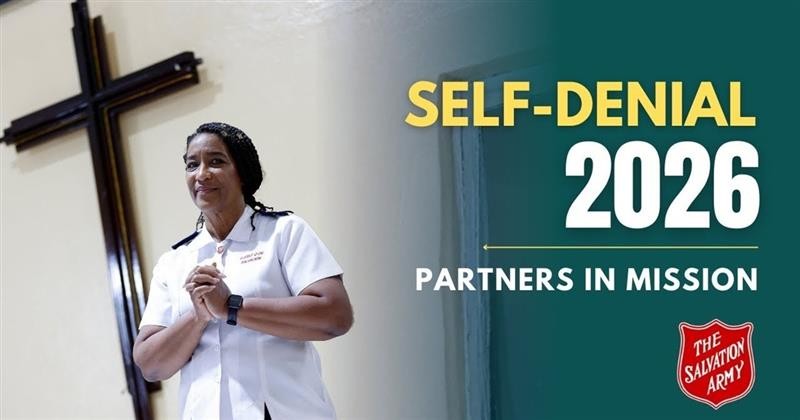Christians need a newspaper in one hand and a Bible in the other—according to theologian Karl Barth. In our Talking It Over series, James Read invites thoughtful Salvationists from around the world to reflect on moral and ethical issues. Here, he speaks with Paul Barber about the rising cost of living.
Paul, I don’t know what life is like in New Zealand right now, but here in Canada the cost of living is top of mind for lots of people. Politicians are calling it an affordability crisis. Overall inflation was 6.8 percent in 2022, a 40-year high. The cost of food rose 9.8 percent that year and the rise in the price of gasoline was a whopping 28.5 percent. The inflation rate in 2023 is much lower—about three percent overall. That’s making the economists who set a target of two percent happy. But to reach that target, the banks have driven interest rates to their highest level since 2001. Since incomes have not kept pace, that has meant hardship for middle-class people who have mortgages to pay, and higher rents for those who don’t own their homes.
—Jim
The big picture is similar in New Zealand. In the past 18 months, the cost of living went from something not often talked about to far and away the top concern in public polls, and it was a central issue in our 2023 election. But in The Salvation Army’s contribution to the public debate, we at the social policy and parliamentary unit are focusing on what life is like for the 150,000 people we work with every year in The Salvation Army in New Zealand and whose circumstances are the focus of our annual state of the nation report. For them it’s not just about inflation, it’s about those other social and spiritual impacts that come with rising costs. Most will be receiving some form of welfare benefit. If they have work, it’s often inadequate and poorly paid. They may be homeless or applying for scarce social housing or struggling to pay rent. Food insecurity is a constant or frequent reality for one in five New Zealanders—and this in a country of five million that produces enough food to feed a population of 50 million.
—Paul
Something’s very wrong with this picture. No one in your country or ours should have to worry about whether they will have food for the day. Yet the reports say that more Canadians than ever are relying on food banks. According to Food Banks Canada, usage in March 2023 was 78 percent higher than in March 2019. Approximately 400,000 people received food hampers and toys from The Salvation Army this past Christmas. These are staggering numbers.
But sometimes I need to be reminded that the “costs of living” are not just material. My wife and I are retired now. We own our home, and we are mortgage-free. With decent pensions from work and with Canada Pension Plan income, we have been pretty well insulated from inflation. That means the facts you and I have been relating so far can feel quite abstract and bloodless. When that happens, I need to remember that every social issue has a face.
I try to put myself in someone else’s place. What would it be like to wonder what to do when the credit cards are maxed out, the kids are still growing and the fridge stops working? When I’m afraid I won’t have coverage if I get sick? And on and on. I have prided myself on being a “good provider” and so I can only imagine the feelings of failure that would engulf me if I sensed that I couldn’t make ends meet. I know I would do a lot to protect my kids from the embarrassment of being poorer than their classmates. Could I bring myself to get a food hamper from “the Sally Ann”? If I were to do that, would they treat me with syrupy condescension? Would they want to know if I deserved the aid?
The personal and social dimensions of the cost-of-living issue seem Photo: Igor Vershinsky/iStock via Getty Images Plus so complex and interconnected, The Affordability Crisis Salvationist January/February 2024 23 it’s hard to know where to start. There is no simple solution.
—Jim
What would it be like to wonder what to do when the credit cards are maxed out, the kids are still growing and the fridge stops working?
I think there is a simple answer: make sure people have enough income to live with dignity.
Our previous government introduced the Child Poverty Reduction Act that set goals to more than halve child poverty by 2028. That means there was moral and legislative pressure to act and report. And it has been quite successful, in that over the five years for which we have reporting, there was an average of a 43 percent increase in the incomes of welfare households. The minimum wage was increased, as were social welfare benefits that were demonstrably too low, not giving people enough to live on. Though the gap in household incomes is still large, it has been narrowed, and not only has child poverty itself been reduced but there is also improvement in the hardship measures.
The legislation received cross-party support when it was first introduced, and so we hope that we will continue to see goals pursued by the parties that will form the new government. I feel we have a really strong evidence base to say we know what works. It’s not easy and in some ways it’s expensive, but if you put people first, that’s what you do.
—Paul
These are really encouraging results, Paul. And the “people first” principle jives well with the economic framework that the International Moral and Social Issues Council developed in 2012. That framework contends that “the economy only functions in accordance with God’s plan when it works to bless a community.” And it goes on to say, “The bounty and goodness of God’s total creation implies that there should be enough available for all to live a decent life. God’s creation is generous and his plan is that there be no poverty, deprivation or exploitation.”
Would you agree with that? Are there other parts of a Christian and Salvationist perspective that shape your thinking about the economy?
—Jim
I think of Jesus’ story of the Good Samaritan, naturally. The compassionate response to people in immediate need cuts close to the heart of Christian ethics. At the same time, we need to ask upstream questions. For instance, if everyone knew the road on which the Samaritan found the injured man was dangerous, why had there been no preventative intervention? As the saying goes, it’s good to have an ambulance at the bottom of the cliff, but let’s put guard rails at the top, too.
—Paul
As you say that, I think of the words of Isaiah 58:12: “You will be called Repairer of Broken Walls, Restorer of Streets with Dwellings.”
—Jim
It doesn’t have to be an either/or. You can provide both “ambulance drivers” and “road engineers.” Let me give you a good example from our recent experience in New Zealand. Mobile traders (shopping trucks) abound in lower socio-economic communities throughout New Zealand, where shops are a distance away and cars are in short supply. The shopping trucks offer a range of products, including electronic goods, tableware, household items and food, sold directly to customers at their homes. The prices have been substantially higher than comparable goods at mainstream retail outlets. If they have needed it, customers have been offered credit to make their purchases—at rates as high as 800 percent per annum.
In early 2019, the Army pioneered a demonstration project as an ethical alternative to this exploitative mobile shopping industry. The idea of “The Good Shop” (as the Army vans were called) was to compete with the established mobile traders in selected areas, arranging the purchase and delivery of goods at retail prices directly from mainstream stores. Interest-free credit was provided.
The aim was to be as disruptive as possible, shut the market down, provide an alternative, build financial capacity for people, be financially sustainable for an appropriate season and then be replaced by ethical commercial initiatives, no longer requiring The Salvation Army’s intervention.
At the same time, The Salvation Army aimed to raise public awareness of the predatory and exploitative practices that were trapping the poor with crippling debts and advocated for the government to intervene. The result? In the year and a half of “The Good Shop” project, 511 interest-free loans were provided to impoverished customers, and the government passed laws that put caps on the non-bank interest rates that could be charged.
Both immediate relief for the poor and long-term protection from falling further into poverty—ambulances and guardrails.
—Paul
Fascinating. I find it noteworthy that The Salvation Army in New Zealand has actively advocated for legislation to reduce poverty. Not that Salvationists in Canada would necessarily disagree with what was advocated for, but we don’t have a “social policy and parliamentary unit” in our territory. And when elections are called in Canada, unlike New Zealand, the Army doesn’t distribute “pressing issues” papers in our corps, encouraging people to use these papers as they consider who they will vote for and what issues they will consider when they vote. I wonder how Canadian Salvationists would react if we did. Perhaps I should ask.
It has been great chatting with you, Paul. Grace and peace in abundance be on you and your ministry.
—Jim
Dr. James Read, OF, was the executive director of The Salvation Army’s Ethics Centre for many years and served as chair of the International Moral and Social Issues Council. Now retired, he attends Heritage Park Temple in Winnipeg. Paul Barber is a social policy analyst in the social policy and parliamentary unit in the New Zealand, Fiji, Tonga and Samoa Territory.
Photo: Igor Vershinsky/iStock via Getty Images Plus
This story is from:










Comment
On Monday, January 15, 2024, Robert Brewer said:
Leave a Comment